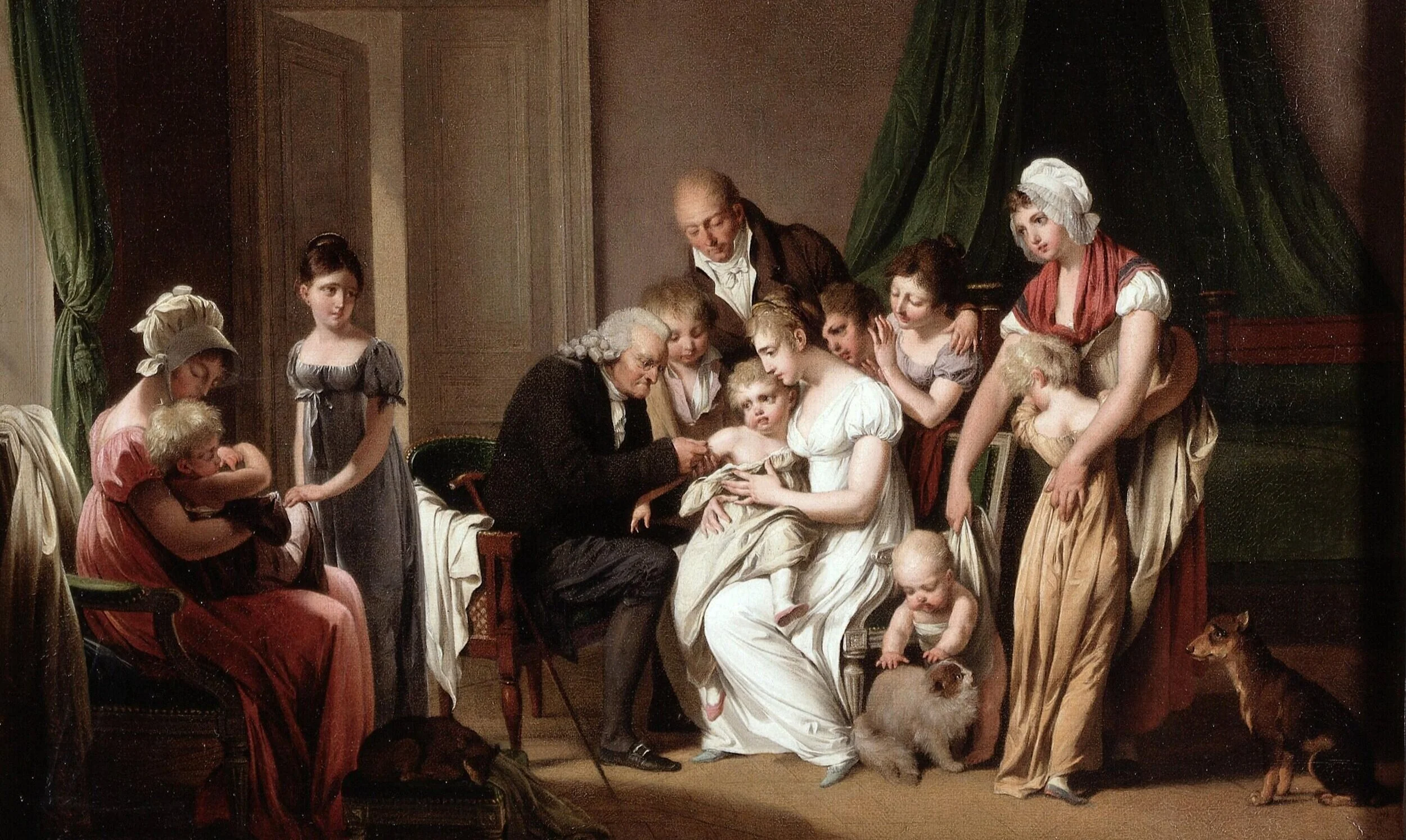Social Influence and Vaccination
In the past year, public health officials have attempted to use various methods—from lotteries, college scholarships, and gift cards—to incentivize vaccination against the COVID-19 virus. Now, some jurisdictions in the U.S. are trying out another method to encourage folks to roll up their sleeves—utilizing social media influencers. In Colorado, a police officer with a Spanish-language Facebook page, a fashion blogger, and an African refugee advocate have all been enlisted to help sway the opinion of hesitant populations, especially those historically underserved by the medical community.
Vaccine influencers are not unique to our current moment. In fact, the inoculation campaign Lady Mary Wortley Montagu launched in 18th century England has been pinpointed by historians as pivotal in popularizing the practice of inoculation during the height of the smallpox pandemic. The procedure of inoculation against smallpox was itself not new in the early 18th century. Rather, it had been practiced for decades by a vast network of women medical professionals in the Ottoman empire. Engrafting involved taking a bit of pus from a smallpox patient and using a needle to transfer the pus beneath the skin of someone who had not yet been exposed. This technique often resulted in a mild smallpox infection, recovery from which would produce immunity.
Engrafting came with risks, but these risks were still preferable to the virus itself, which came with a hefty mortality rate. Still, despite documented knowledge that the Royal Society was aware of the practice at the turn of the century, English physicians failed to adopt it for an additional 20 years, until 1721. Understanding Montagu’s success and earnestness in the face of institutional inertia exhibited by the Royal Society can provide an important window into why vaccine influencers might be a mechanism for social good today. Even though Montagu was a member of the bourgeoisie, her gender and status as medical outsider allowed her to consider other practices beyond those sanctioned by the medical community and made her a compelling advocate to those whose stories were often overlooked.
“Even though Montagu was a member of the bourgeoisie, her gender and status as medical outsider allowed her to consider other practices beyond those sanctioned by the medical community and made her a compelling advocate to those whose stories were often overlooked.”
Montagu contracted smallpox in 1715, and a few months after she recovered from smallpox, her husband was appointed the English Ambassador to Constantinople. While accompanying her husband in Turkey three years later, Montagu asked a Greek woman to perform an inoculation on her son. After witnessing the procedure, Montagu spread word about its power to her family and elite friends. In a letter to her friend Sarah Chiswell, she wrote, “The small-pox, so fatal, and so general amongst us, is here entirely harmless, by the invention of engrafting.” After returning to England in April of 1721, she asked Charles Maitland, an English doctor, to inoculate her daughter as well with the same procedure. Immediately, Montagu ensured her daughter’s inoculation was publicized; she visited elite households to demonstrate the safety of the procedure.
Montagu was not the first English citizen to inoculate their own child, nor was she the first to attempt to educate the greater public on inoculation. Nonetheless, Montagu’s determination and considerable cultural capital presented a watershed opportunity for popularizing inoculation in England at a crucial time during a deadly epidemic. Following her own children’s inoculation, the families of at least six of Montagu’s friends also underwent the procedure. Princess Caroline of Wales offered it to six prisoners as an alternative for their death sentence. All of the prisoners in the inoculation trial survived the procedure. By advocating engrafting’s merits to powerful people, Montagu had created a cultural buzz surrounding the potential power of inoculation.
Even though the Age of Enlightenment brought many developments in medicine, mathematics, and physics, these new discoveries also cemented Western confidence in the supremacy of their scientific outlook on a global scale to the exclusion of other forms of knowledge, thus halting medical advancement. Upon arriving in Turkey with her husband, Montagu immediately immersed herself as fully as she could in the culture, learning Turkish, familiarizing herself with Turkish customs, and most importantly attending the ritual inoculation “parties” when one health expert would consecutively inoculate about 15 people. Such activities and exposure would lead her to reach out to a Greek woman about inoculating her own son.
The colonialist culture in which Montagu was embedded back in England viewed the East as backward, despotic, and uncivilized. This view was popularized by figures such as writer Aaron Hill and physician William Wagstaffe, the latter of whom argued that the smallpox inoculation would not work on the English subject because of their inherently “richer” blood. Instead, Wagstaffe insinuated the English would need a more luxurious kind of medicine than a cheap procedure carried out by non-physicians.
A year after her recovery from smallpox, Montagu penned a poem, “Saturday; the Small Pox,” in which she detailed the experience of a smallpox sufferer, named Flavia. This poem was part of a larger Court Ecologues series, privately printed for distribution among Monatgu’s friends. In “Saturday,” Flavia seeks out medical attention from a doctor who bears a “golden headed cane,” suggesting his wealth and affluence. Montagu uses the figure of the doctor in her poem to critique medical practitioners who would not support inoculation for economic reasons (the treating of smallpox was a lucrative business for physicians at the time). Flavia goes to the doctor looking for a cure, but in the end, he is only able to prescribe cordials and make empty promises.
Montagu’s writing extended her influence in the elite circles of which she was a part. Just as social media creates proximity and familiarity among users, Montagu’s writing primed readers to trust her, not only providing a window into her experiences, allowing her readers to identify with her voice but also for laying the groundwork for her critique of prohibitive Western medicine. Though this critique was pseudonymous, and therefore separate from Montagu’s identity, the writing worked to actively dismantle accounts like Wagstaffe’s.
Additionally, Montagu made space for the gendered experience of smallpox, which was absent from medical discourse at the time. In her poem about smallpox, Montagu’s speaker is forced to confront the transformation her smallpox scars have taken on her appearance, calling herself a “frightful spectre.” She bids “adieu” to her surroundings, personifying them with sorrow: “ye parks ! — in some obscure recess, / ‘ Where gentle streams will weep at my distress.” Men who contracted smallpox largely feared for their life, but women feared not only losing their life but also their beauty, if they were to survive. Beauty and appearance played a significant role in women’s cultural and economic capital and Montagu’s message encouraged inoculation as a way to avoid the effect smallpox could have on appearance. All the more reason for Flavia to “Forsake mankind, and bid the world adieu!” despite surviving the disease.
“Her role as vaccine influencer demonstrates why the same is important today; our interrelatedness is our greatest asset.”
Whereas Enlightenment values emphasized mastery over the self (and Montagu was certainly a proponent of Enlightenment values), Montagu depicted a self that is inherently vulnerable in her poetry. Implicitly, Montagu’s vulnerability dispels conceptualizations of British mastery and exceptionalism inherent in arguments that condemn inoculation through affirming English supremacy. Echoes of her ideas might be noticed today in those who discourage the idea that “healthy” individuals need not get the COVID-19 vaccine.
In the poem, Flavia’s vulnerability expels her from the world as she understands it. But this world—as Montagu has painted it in the poem—is perhaps one worth leaving; short-sightedness by those in power is ever-present. At the end of the poem, Flavia bids adieu to “all the world,” but not all worlds, suggesting a new one is in order.
Just as Montagu’s writing allowed her to intervene in public discourse when voices that had shored up their authority seemed immovable, modern-day vaccine influencers seem specifically poised to speak to those who are historically underserved by the medical community. Montagu was able to chip away at dominant assumptions in her society, which often stemmed from deeply internalized misinformation. When these primary channels of public health failed, Montagu demonstrated that narrative, personability, an open mind, and patience were all essential aspects of changing minds in dire times.
Today, the global fight against COVID looks quite different from the British medical consensus Montagu combated. Individual experiences of what is to be taken as truth vary greatly depending on not only who we talk to on a daily basis but what pocket of the internet the algorithm has served up for us. Still, Montagu’s positioning as a non-medical woman willing to learn about another culture’s medical practices demonstrates an ability to allow one’s closely held paradigms to shift as they come into contact with another, and through dedication, spread the message.
Montagu reached her family and friends but also those outside her immediate social circle. Her role as vaccine influencer demonstrates why the same is important today; our interrelatedness is our greatest asset. We have much to mourn, and a whole world waiting on the other side to build together.
Image credit: A man vaccinating a young child held by its mother, with other members of the household looking on. Louise Boilly, ca 1807 (Wellcome Collection | CC BY NC 4.0)






